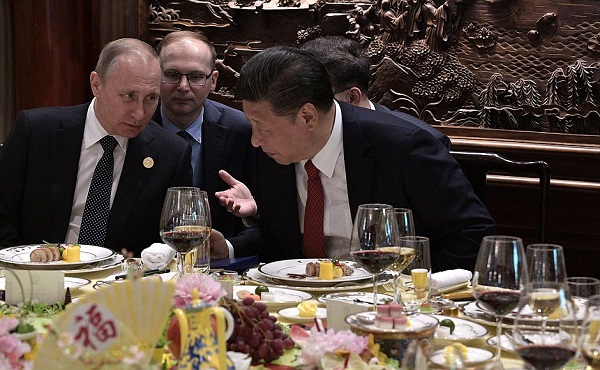

Follow us on:  
|


Russian President Vladimir Putin and Chinese President Xi Jinping in Beijing on 14 May 2017 [PPIO]
Xi will visit Russia and Germany from July 3-6, Chinese Foreign Ministry spokesperson Lu Kang said on Tuesday, at the invitations of Russian President Vladimir Putin, German President Frank-Walter Steinmeier and Chancellor Angela Merkel.
“The two leaders will exchange views on deepening the relations of comprehensive strategic partnership and cooperation and strengthening political trust between the two countries. They will also raise some pressing bilateral and international issues of mutual interest,” Chinese Foreign Ministry Spokesperson Lu Kang said.
Putin and Xi have announced earlier that the two sides are working on plans for docking China’s ambitious Silk Road project and the Russia-led Eurasian Economic Union.
“The main thing for us to do is to join our efforts within the framework of the Eurasian Economic Union and China’s Silk Road initiative,” Putin said during an annual televised question-and-answer session with the Russian public earlier this month.
Trade between China and Russia will reach $80 billion by the end of the year, according to Chinese Commerce Ministry spokesman Shen Danyang.
“Russian exports to China rose by 33 percent in January-April while deliveries of Chinese goods to Russia expanded by 22 percent,” Shen said.
Russia and China sealed a raft of energy deals last year.
The deals involved the sale of stakes in a number of Russian projects to Chinese firms, an oil supply contract and joint investments in petrochemical projects in Russia. Rosneft, Russia’s top oil producer, agreed with China National Chemical Corporation (ChemChina) that ChemChina would take a 40 percent stake in Rosneft’s planned petrochemical complex VNHK in Russia’s Far East.
On Monday, Putin-Xi talks are expected to focus on economic cooperation as well as ways to strengthen global strategic stability.
The two allies are united in their opposition to deployment of anti-missile systems in Asia and Eastern Europe, saying those who deploy them often acted under false pretences.
Beijing and Moscow are also united in their opposition to the unseating of Syrian President Bashar Al- Assad by external forces.
TBP and Agencies